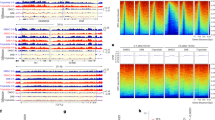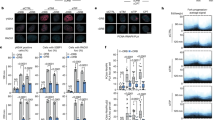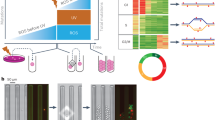Abstract
UNDIFFERENTIATED murine teratocarcinoma stem cells do not support simian vacuolating virus 40 (SV40) or polyoma virus (Py) replication or even the expression of the early papovavirus proteins. These undifferentiated cells are also entirely refractory to infection with ecotropic murine C-type viruses. If the stem cells are allowed to differentiate to a variety of somatic cell types, they become susceptible to infection by SV40, Py and ecotopic murine C-type viruses1–4. In contrast, adenovirus type 2 can infect and replicate in the undifferentiated stem cells, although not as efficiently as it can in the differentiated mouse cells5 and certainly much less efficiently than it does in human cells. Studies on the mechanism of the resistance of the undifferentiated teratocarcinoma cells to infection by SV40 has shown that the block is not at the level of virus adsorption, penetration uncoating or transport to the nucleus6. We present here evidence indicating that the absence of expression of SV40 genetic information in nondifferentiated teratocarcinoma cells reflects an inability to generate stable viral mRNA. More specifically, the refractoriness of these cells to SV40 seems to be correlated, at least in part, with a deficiency in the splicing of viral mRNA.
This is a preview of subscription content, access via your institution
Access options
Subscribe to this journal
Receive 51 print issues and online access
$199.00 per year
only $3.90 per issue
Buy this article
- Purchase on Springer Link
- Instant access to full article PDF
Prices may be subject to local taxes which are calculated during checkout
Similar content being viewed by others
References
Swartzendruber, D. E. & Lehman, J. M. J. cell. Physiol. 85, 179 (1975).
Teich, N. M., Weiss, R., Martin, G. R. & Lowy, D. R. Cell 12, 973–982 (1977).
Périés, J., Alves-Cardoso, E., Canivet, M., Debons-Guillemin, M. C. & Lasneret, J. J. natn. Cancer Inst. 59, 463–465 (1977).
Topp, W., Hall, J. D., Rifkin, D., Levine, A. J. & Pollack, R. J. cell. Physiol. 93, 269–276 (1977).
Kelly, F. & Boccara, M. Nature 262, 409–411 (1976).
Swartzendruber, D. E., Friedrich, T. D. & Lehman, J. M. J. cell. Physiol. 93, 25 (1977).
Bernstine, E. G., Hooper, M. L., Grandchamp, S. & Ephrussi, B. Proc. natn. Acad. Sci. U.S.A. 70, 3899–3903 (1973).
Strickland, S. & Mahdavi, V. Cell 15, 393–403 (1978).
Sherman, M. I. & Miller, R. A. Devl. Biol. 63, 27–37 (1978).
Simmons, D. T., Takemoto, K. K. & Martin, M. A. J. Virol. 24, 319–325 (1977).
Tegtmeyer, P., Rundell, K. & Collins, J. K. J. Virol. 21, 647–657 (1977).
Prives, C. & Beck, Y. Inserm 59, 175–187 (1977).
Crawford, L. V. et al. Proc. natn. Acad. Sci. U.S.A. 75, 117–121 (1978).
Edidin, M., Patthey, H. L., McGuire, E. J. & Sheffield, W. D. in Embryonic and Fetal Antigens in Cancer, 239–248 (Oak Ridge National Laboratory, Tennessee, 1971).
Edidin, M., Gooding, L. R. & Johnson, M. 7th Symposium, Immunological Approaches to Fertility Control, 1–19. (Karolinska Symposia on Research, 1974).
Kuff, E. L., Ferdinand, F.-J. & Khoury, G. J. Virol. 25, 28–36 (1978).
Gariglio, P. & Mousset, S. FEBS Lett. 56, 149–155 (1975).
Ferdinand, F.-J., Brown, M. & Khoury, G. Virology 78, 150–161 (1977).
Khoury, G. & May, E. J. Virol. 23, 167–176 (1977).
Khoury, G., Byrne, J. C., Takemoto, K. K. & Martin, M. A. J. Virol. 11, 54–60 (1973).
Berk, A. J. & Sharp, P. A. Cell 12, 721–732 (1977).
Berk, A. J. & Sharp, P. A. Proc. natn. Acad. Sci. U.S.A. 75, 1274–1278 (1978).
Lai, C.-J., Dhar, R. & Khoury, G. Cell 14, 971–982 (1978).
May, E., Kress, M. & May, P. Nucleic Acids Res. 9, 3083–3099 (1978).
Lai, C-J. & Khoury, G. Proc. natn. Acad. Sci. U.S.A. (in the press).
Gruss, P. et al. Proc. natn. Acad. Sci. U.S.A. (in the press).
Shih, T. Y., Khoury, G. & Martin, M. A. Proc. natn. Acad. Sci. U.S.A. 70, 3506–3510 (1973).
Author information
Authors and Affiliations
Rights and permissions
About this article
Cite this article
SEGAL, S., LEVINE, A. & KHOURY, G. Evidence for non-spliced SV40 RNA in undifferentiated murine teratocarcinoma stem cells. Nature 280, 335–338 (1979). https://doi.org/10.1038/280335a0
Received:
Accepted:
Issue Date:
DOI: https://doi.org/10.1038/280335a0
This article is cited by
-
Lack of retrovirus gene expression in teratocarcinoma stem cells is limited to the nucleus
Somatic Cell Genetics (1982)
-
Microinjection of cloned retroviral genomes into mouse zygotes: integration and expression in the animal
Nature (1981)
-
Polyoma DNA sequences involved in control of viral gene expression in murine embryonal carcinoma cells
Nature (1981)
Comments
By submitting a comment you agree to abide by our Terms and Community Guidelines. If you find something abusive or that does not comply with our terms or guidelines please flag it as inappropriate.



